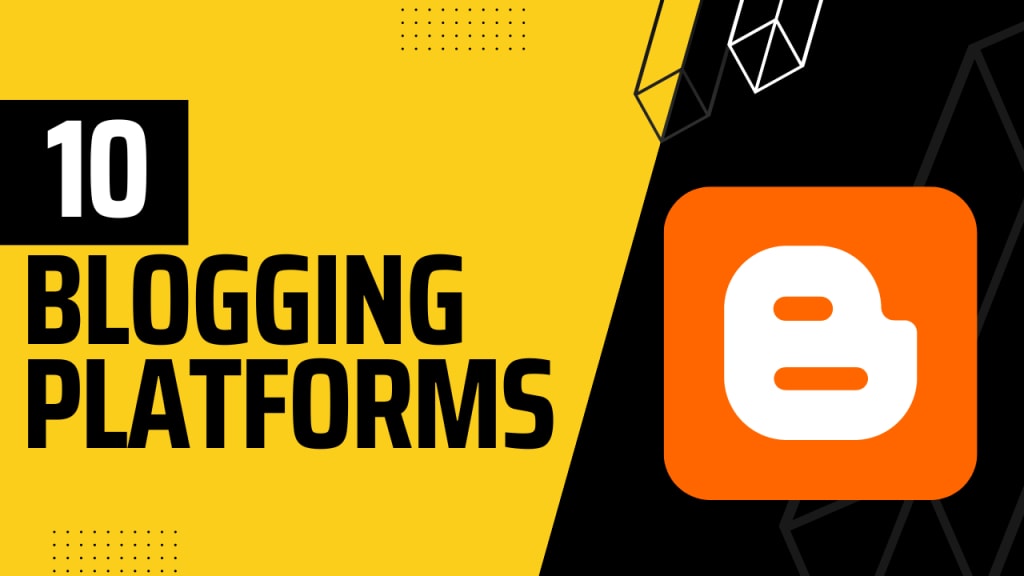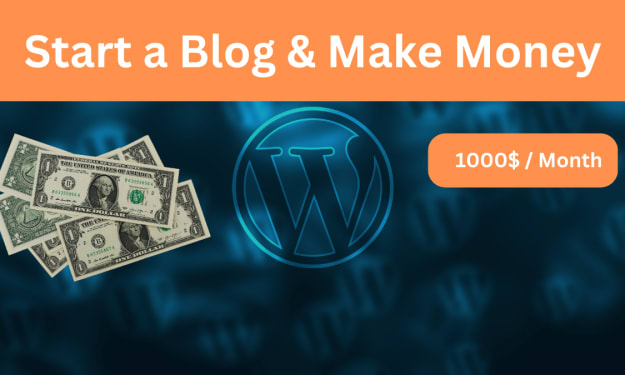Top 10 Blogging Platforms for Earning
Blogging

Are you an avid blogger looking to monetize your content and create a steady income stream? You’re not alone. More and more bloggers are seeking ways to generate revenue from their blogs. Fortunately, several fantastic platforms can assist you in accomplishing this.
Blogging is akin to having your own website, allowing you to publish any information you choose, all at no cost. As a blogger, you can create content on a wide range of topics and share it with millions of readers worldwide.
Without further delay, let’s explore the top ten blogging platforms to earn money in 2023.
10 BEST BLOGGING PLATFORMS TO MAKE MONEY IN 2023
Here you get the top 10 best blogging platforms that you can use to make money in 2023.
WordPress.org is the most popular blogging platform in the world, used by millions of bloggers worldwide. This self-hosted platform is an excellent choice for bloggers who want complete control over their website’s design and functionality. With WordPress, you can customize your site with thousands of themes and plugins, making it easy to create a professional-looking blog that is optimized for SEO and user experience.
Pros
It’s user-friendly
It provides wide range of theme and plugins
It has a large community of users
Cons
New updates can sometimes break old themes and plugins
It’s free version doesn’t support all available plugins
Blogger
Blogger is a free blogging platform that is owned by Google. It’s a great option for beginners who want to start a blog without investing money in hosting or domain name registration. With Blogger, you can quickly create a blog and start publishing content in a matter of minutes. However, keep in mind that the platform’s functionality is limited, and you won’t have complete control over your site’s design.
Pros
It is a user-friendly platform for new bloggers
It provides a lot of templates to choose from
It is owned by Google
It has a clean user interface
Cons
It doesn’t support all plugins
The free version has limited features
WordPress VIP
If you’re a blogger looking for a professional-grade platform that can handle high traffic and complex content, WordPress VIP is the way to go. WordPress VIP is the enterprise version of the popular WordPress platform, and it offers a wide range of features and services that are tailored to meet the needs of large-scale websites and blogs.
One of the key benefits of WordPress VIP is its scalability. Whether you’re receiving thousands or millions of visitors per day, the platform can handle the traffic with ease. This makes it an ideal choice for bloggers who have already built a large following and are looking to take their website to the next level.
WordPress VIP also comes with a wide range of customization options. You can choose from a variety of themes and plugins, or even create your own custom plugins to add functionality to your website. This allows you to create a unique and engaging user experience for your readers.
Pros
It’s the most customizable platform
It has advanced features
It offers additional tools, advertising programs and support staffs
Cons
It is expensive
It has bad reputation for its high pricing
Tumblr
Tumblr is a microblogging platform that is popular among bloggers who want to create short-form content. It’s a great option for bloggers who want to share their thoughts and ideas in a casual and informal way. With Tumblr, you can quickly create a blog and start publishing content without any technical knowledge.
Pros
It’s a social blogging platform
Many users can post various topics of their choice
It is easy to use
Cons
It doesn’t have complete customization features
It’s user interface is difficult to use
WordPress.com
If you’re just getting started with blogging and want a user-friendly platform that’s easy to use, WordPress.com is the perfect choice. WordPress.com is a simplified version of the popular WordPress platform, and it’s designed to be easy to use for bloggers of all skill levels.
One of the key benefits of WordPress.com is its simplicity. The platform comes with a range of pre-designed themes that you can choose from, making it easy to create a professional-looking website without any coding or design skills. Additionally, the platform comes with a drag-and-drop editor that makes it easy to create and edit pages and posts.
Pros
It’s free to use
You don’t need any coding skills to use it
It has thousands of themes and plugins for your blog
It has a large user community
Cons
It’s free version doesn’t support all plugins
The Basic plan doesn’t include your own domain name
Medium
Medium is a blogging platform that has gained popularity in recent years due to its clean and simple interface. It’s an excellent choice for writers who want to focus on creating high-quality content without worrying about the technical aspects of running a blog. Medium also has a built-in audience, which means your content can reach a wider audience than on other platforms.
Pros
It has a great interface
It’s easy to use
Reading other people’s posts is fun and exciting
Good for beginner bloggers
Cons
It doesn’t allow the use of video or audio files
There are no customization features
Wix
Wix is a website builder that also offers a blogging platform. It’s an excellent choice for bloggers who want to create a professional-looking website without any technical knowledge. With Wix, you can choose from hundreds of templates and customize your site with drag-and-drop tools. However, keep in mind that the platform’s SEO capabilities are limited, which can impact your site’s visibility on search engines.
Pros
It is free to use
It has a large number of templates
You don’t need any coding knowledge to use Wix
You have the ability to customize your blog with widgets, apps etc.
Cons
It has a free version, but it’s ads are annoying
It doesn’t have complete customization features
Ghost
Ghost is a blogging platform that is designed for writers who want to focus on creating content without any distractions. It’s a great option for bloggers who want a clean and simple interface that is optimized for writing. With Ghost, you can create a professional-looking blog that is optimized for SEO and user experience.
Pros
It has an excellent interface
You can write about anything
It is easy to use even for beginners
Cons
It doesn’t have video or audio sharing features
Squarespace
Squarespace is another website builder that offers a blogging platform. It’s an excellent choice for bloggers who want a website that is both visually stunning and functional. With Squarespace, you can choose from a variety of templates and customize your site with ease. The platform also offers excellent SEO capabilities, making it easier for your content to rank higher on search engines.
Pros
It has a beautiful interface
You can write about any topic you choose
It is very easy to use
It’s free to sign up
You can customize your blog with widgets, apps etc.
Cons
It doesn’t support video or audio files for sharing
Hubpages
If you’re an expert in a particular topic or niche and want to share your knowledge with the world while earning money, HubPages is the platform for you. HubPages is a content-sharing platform that allows you to publish articles on a variety of topics and earn money through advertising and affiliate programs.
One of the key benefits of HubPages is its community. The platform has a large and active community of writers who share their expertise and provide feedback on each other’s articles. This makes it a great place to connect with other writers and learn from their experiences.
HubPages also comes with a range of monetization options. You can earn money through the platform’s advertising program, which displays ads on your articles and pays you a share of the revenue. Additionally, you can earn money through affiliate programs by including affiliate links in your articles and earning a commission on any sales made through those links.
Pros
It allows users to monetize their blog
You can write about anything
Cons
It doesn’t have a huge community
Paid Vs Free Blogging Platforms: Which One is Right for You?
Free Platforms
When it comes to starting a blog, one of the biggest decisions you’ll need to make is whether to use a free or paid blogging platform. While free platforms like WordPress.com and Blogger can be a great choice for beginners, paid platforms like Squarespace and Wix offer more features and flexibility.
One of the main benefits of free blogging platforms is that they’re, well, free. This makes them a great choice for beginners who don’t want to invest a lot of money upfront. Additionally, free platforms often come with a range of pre-designed themes and templates that make it easy to create a professional-looking website without any design or coding skills.
However, free platforms often come with limitations. For example, you may be limited in terms of storage space, which can be an issue if you plan to post a lot of high-quality images or videos. Additionally, free platforms often come with ads that can be distracting for your readers and can detract from the overall look and feel of your website.
Paid Platforms
Paid blogging platforms, on the other hand, offer more features and flexibility. Platforms like Squarespace and Wix allow you to create custom designs and layouts, giving you complete control over the look and feel of your website. Additionally, paid platforms often come with more storage space and bandwidth, which can be a huge benefit if you plan to post a lot of content.
However, paid platforms can be more expensive than free platforms, which may be a drawback for some bloggers. Additionally, paid platforms often require more technical skills, which can be a barrier for beginners who are just starting out.
Drawbacks of Free Blogging Platforms: What to Consider Before You Start
While free blogging platforms like WordPress.com and Blogger offer a range of benefits, they also come with some drawbacks that you should be aware of before you start your blog.
One of the main drawbacks of free blogging platforms is that they often come with limitations. For example, you may be limited in terms of storage space, which can be an issue if you plan to post a lot of high-quality images or videos. Additionally, free platforms often come with ads that can be distracting for your readers and can detract from the overall look and feel of your website.
Another potential drawback of free blogging platforms is that they may not offer as much flexibility as paid platforms. While you can customize your blog’s design and layout to some extent, you may not have as many options as you would with a paid platform like Squarespace or Wix.
Free blogging platforms also come with a range of technical limitations. For example, you may not be able to use certain plugins or add-ons that can enhance the functionality of your website. Additionally, you may not be able to access advanced analytics or other tools that can help you track your website’s performance and optimize your content for search engines.
Finally, free blogging platforms may not offer as much support as paid platforms. While you can usually find answers to your questions through online forums and documentation, you may not be able to get personalized support from a dedicated customer service team.
Benefits of Paid Blogging Platforms: What You Get When You Invest
While free blogging platforms like WordPress.com and Blogger can be a great choice for beginners or anyone on a tight budget, paid platforms like Squarespace and Wix offer a range of benefits that make them a great choice for more advanced users and businesses.
One of the main benefits of paid blogging platforms is that they offer more features and flexibility than free platforms. For example, you can choose from a wider range of templates and themes, customize your website’s design and layout to a greater extent, and access advanced features like e-commerce tools, membership portals, and email marketing integrations.
Paid blogging platforms also offer more control over your website’s branding and user experience. With a paid platform, you can remove ads and other distractions, and ensure that your website looks and functions exactly as you want it to. Additionally, paid platforms often offer more robust security features, which can be important if you plan to collect sensitive information from your users or process transactions through your website.
Another benefit of paid blogging platforms is that they often come with better customer support. With a paid platform, you can usually get personalized support from a dedicated customer service team, rather than relying on online forums and documentation.
Finally, paid blogging platforms can be a great choice for businesses that want to build a professional online presence. With a paid platform, you can create a website that looks and functions like a custom-built website, without having to invest a lot of time or money upfront.
Drawbacks of Paid Blogging Platforms
While paid blogging platforms offer a range of benefits, they are not without their drawbacks. Before you invest in a paid platform like Squarespace or Wix, it’s important to consider some of the potential downsides.
One of the main drawbacks of paid platforms is the cost. While many paid platforms offer a range of pricing plans to fit different budgets, the cost can still be prohibitive for some bloggers and businesses, particularly those just starting out. Additionally, some paid platforms charge transaction fees or take a percentage of your sales, which can eat into your profits.
Another potential drawback of paid platforms is that they can be more complex and time-consuming to set up and customize than free platforms. While paid platforms often offer more features and flexibility, they also require more technical knowledge and experience to use effectively. If you’re not comfortable with web design or don’t have the time to invest in building and maintaining your website, a paid platform may not be the best choice for you.
Paid platforms can also be less flexible in terms of third-party integrations and plugins. While some paid platforms offer a range of integrations with popular tools and services, others may require you to use their own proprietary tools or limit the number of third-party integrations you can use. This can be a problem if you rely on specific tools or services to run your business or website.
Finally, while paid platforms often offer better customer support than free platforms, the quality of support can vary widely depending on the platform and plan you choose. Some paid platforms offer 24/7 phone and chat support, while others may only offer email support during certain hours. Additionally, some paid platforms may require you to pay extra for personalized support or advanced technical assistance.
Conclusion
In the end, there are plenty of blogging platforms available that can help you monetize your content and create a sustainable income stream. Whether you’re a beginner or an experienced blogger, there’s a platform out there that’s perfect for you. So go ahead and choose the one that suits your needs, and start building your blogging empire today!
Refference : Top 10 Blogging Platforms for Earning
About the Creator
Muhammad Sulaiman
I am a student of computer science.






Comments
There are no comments for this story
Be the first to respond and start the conversation.